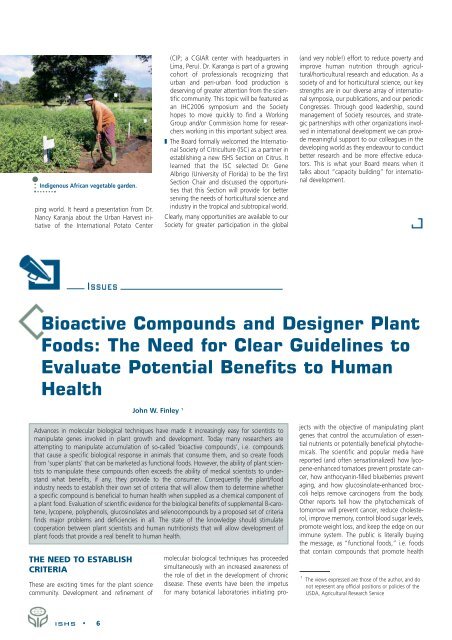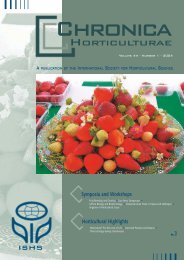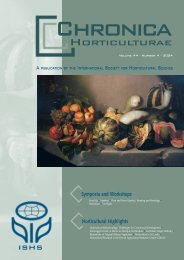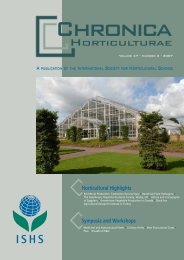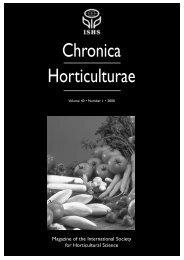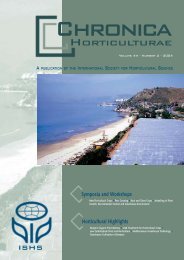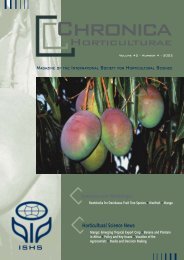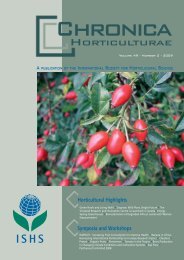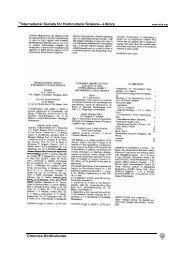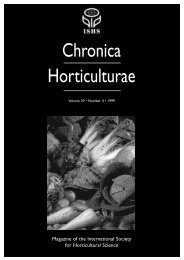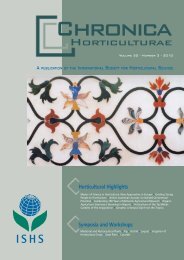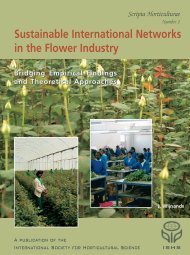Chronica - Acta Horticulturae
Chronica - Acta Horticulturae
Chronica - Acta Horticulturae
You also want an ePaper? Increase the reach of your titles
YUMPU automatically turns print PDFs into web optimized ePapers that Google loves.
Indigenous African vegetable garden.<br />
ping world. It heard a presentation from Dr.<br />
Nancy Karanja about the Urban Harvest initiative<br />
of the International Potato Center<br />
(CIP; a CGIAR center with headquarters in<br />
Lima, Peru). Dr. Karanga is part of a growing<br />
cohort of professionals recognizing that<br />
urban and peri-urban food production is<br />
deserving of greater attention from the scientific<br />
community. This topic will be featured as<br />
an IHC2006 symposium and the Society<br />
hopes to move quickly to find a Working<br />
Group and/or Commission home for researchers<br />
working in this important subject area.<br />
❚ The Board formally welcomed the International<br />
Society of Citriculture (ISC) as a partner in<br />
establishing a new ISHS Section on Citrus. It<br />
learned that the ISC selected Dr. Gene<br />
Albrigo (University of Florida) to be the first<br />
Section Chair and discussed the opportunities<br />
that this Section will provide for better<br />
serving the needs of horticultural science and<br />
industry in the tropical and subtropical world.<br />
Clearly, many opportunities are available to our<br />
Society for greater participation in the global<br />
(and very noble!) effort to reduce poverty and<br />
improve human nutrition through agricultural/horticultural<br />
research and education. As a<br />
society of and for horticultural science, our key<br />
strengths are in our diverse array of international<br />
symposia, our publications, and our periodic<br />
Congresses. Through good leadership, sound<br />
management of Society resources, and strategic<br />
partnerships with other organizations involved<br />
in international development we can provide<br />
meaningful support to our colleagues in the<br />
developing world as they endeavour to conduct<br />
better research and be more effective educators.<br />
This is what your Board means when it<br />
talks about “capacity building” for international<br />
development.<br />
ISSUES<br />
Bioactive Compounds and Designer Plant<br />
Foods: The Need for Clear Guidelines to<br />
Evaluate Potential Benefits to Human<br />
Health<br />
John W. Finley 1 1 The views expressed are those of the author, and do<br />
Advances in molecular biological techniques have made it increasingly easy for scientists to<br />
manipulate genes involved in plant growth and development. Today many researchers are<br />
attempting to manipulate accumulation of so-called ‘bioactive compounds’, i.e. compounds<br />
that cause a specific biological response in animals that consume them, and so create foods<br />
from ‘super plants’ that can be marketed as functional foods. However, the ability of plant scientists<br />
to manipulate these compounds often exceeds the ability of medical scientists to understand<br />
what benefits, if any, they provide to the consumer. Consequently the plant/food<br />
industry needs to establish their own set of criteria that will allow them to determine whether<br />
a specific compound is beneficial to human health when supplied as a chemical component of<br />
a plant food. Evaluation of scientific evidence for the biological benefits of supplemental ß-carotene,<br />
lycopene, polyphenols, glucosinolates and selenocompounds by a proposed set of criteria<br />
finds major problems and deficiencies in all. The state of the knowledge should stimulate<br />
cooperation between plant scientists and human nutritionists that will allow development of<br />
plant foods that provide a real benefit to human health.<br />
THE NEED TO ESTABLISH<br />
CRITERIA<br />
These are exciting times for the plant science<br />
community. Development and refinement of<br />
molecular biological techniques has proceeded<br />
simultaneously with an increased awareness of<br />
the role of diet in the development of chronic<br />
disease. These events have been the impetus<br />
for many botanical laboratories initiating projects<br />
with the objective of manipulating plant<br />
genes that control the accumulation of essential<br />
nutrients or potentially beneficial phytochemicals.<br />
The scientific and popular media have<br />
reported (and often sensationalized) how lycopene-enhanced<br />
tomatoes prevent prostate cancer,<br />
how anthocyanin-filled blueberries prevent<br />
aging, and how glucosinolate-enhanced broccoli<br />
helps remove carcinogens from the body.<br />
Other reports tell how the phytochemicals of<br />
tomorrow will prevent cancer, reduce cholesterol,<br />
improve memory, control blood sugar levels,<br />
promote weight loss, and keep the edge on our<br />
immune system. The public is literally buying<br />
the message, as “functional foods,” i.e. foods<br />
that contain compounds that promote health<br />
not represent any official positions or policies of the<br />
USDA, Agricultural Research Service<br />
ISHS • 6


